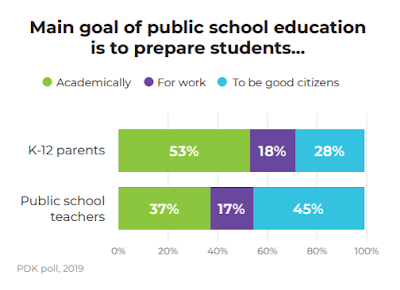Broad Public Support for Civics Transcends Ideological Divides; Parents Must See Value Proposition
by Shawn P. Healy, PhD, Democracy Program Director
PDK’s 51st annual Poll of the Public’s Attitudes Toward the Public Schools (N=2,389) produced a promising finding of near universal support for the teaching of civics (97%), with 70% agreeing that the subject should be required. This is a timely data point in Illinois with Governor Pritzker signing House Bill (HB) 2265 on Friday, legislation to require a semester of civics in Illinois middle schools. Now Public Act 101-0254, it takes effect next July prior to the 2020-2021 school year.
Until recently, civics has been increasingly marginalized as schools focus narrowly on literacy and numeracy, tested subjects that arguably correlate with success in college and careers. According to the PDK Poll, a plurality of teachers rates the civic mission of schools as the primary goal of public education, while most parents prioritize academics.
Parents are also less supportive of required civics courses than the adult population at large (60% versus 70%) and public school teachers (81%). One issue may be some parents’ (29%) concern that courses include political content they personally disagree with. Clearly, the civic learning community must do more to build support among this critical stakeholder group, including making the case for structured engagement with current and controversial issues.
Moreover, despite the ideological rift among civics practitioners centering on teaching patriotism and building attachment to government institutions versus empowering students to build a more perfect union, the survey data suggests that this is a false choice. The vast majority of parents (78%), adults (79%), and teachers (855) believe that civics embodies both facts and values, including honesty, civility, respect for authority, and acceptance of people of different religions. Large majorities also back an emphasis on patriotism (81%) and acceptance of people of different sexual orientations (74%).
Illinois is increasingly becoming a model for state and district policies supportive of students’ K-12 civic development. Civics has flourished from Chicago to Carbondale and across student demographic groups. Our collective work is by no means finished. With Governor Pritzker’s assent to HB 2265, we have the implementation challenge of a career. Along the way, we’ll continue to cultivate public support for civics, acknowledging that the civic mission of schools can only be fulfilled when all stakeholders, parents included, rally to the cause.






Comments
Post a Comment